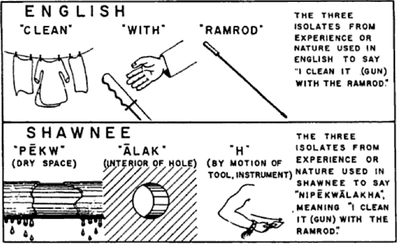Ryan Hu (10) | STAFF REPORTER
Written April 2023
For millennia, linguists, anthropologists and philosophers have speculated the link between thought and speech. However, while modern linguists have no disagreement over the link between thought and language, there is great disagreement over the way languages influence the thought and action of its speakers.
The Sapir-Whorf hypothesis states that a person’s native language affects how they see the world. The hypothesis is split into two separate theories: linguistic determinism and linguistic relativism. Linguistic determinism posits that language can limit a person’s thought process, while linguistic relativism states that language can influence a person’s worldview, but not to a permanent extent exemplified by the former.
Compared to linguistic determinism, linguistic relativism is relatively easy to demonstrate. One example of this can be found in Japanese, which both have complex systems of honorific –or polite– speech. Japanese in particular uses word choice, verb and noun suffixes and prefixes, and name suffixes, to convey the relationship between speakers. The language has three different levels of polite speech that speakers must switch between, depending on the space in which the speaker and its audience is found. This complex system of honorific speech galvanizes Japanese speakers to constantly evaluate their relationship with their listeners.
While linguists, anthropologists and philosophers have speculated the link between thought and language for millennia, there are only a handful of examples of linguistic determinism. One such alleged example is the Pirahã language, which has a couple of hundred native speakers within the Amazon rainforest. A study by Frank et al. in 2008 attempted to teach the Pirahã people how to count. They concluded that the Pirahã people understood the concept of quantity, but after eight months of lessons, not a single Pirahã speaker was able to count to ten, nor were they able to add 1 + 1.
Daniel Everett, the linguist who first claimed that the Pirahã people were unable to count, has also stated that Pirahã lacks a feature called recursion. If true, this would make Pirahã an outlier among all the world’s languages. Everett’s assertions have been widely criticized by linguists who argue that Everett misunderstands the concept of recursion and that the Pirahã people may not have understood Everett properly, as he had to communicate with them in the language.
While Pirahã may be unique in its number and colour systems, or lack thereof, Everett’s description of Pirahã would put it closer to the language of the Chukchansi Yokuts of central California, and not as a language lacking recursion. Everett has also been accused of ignoring criticism, and in the 18 years, since he first published his book on Pirahã, there has certainly been a lot of it. Biggest of all, because of the lack of study done on Pirahã, it is difficult to corroborate Everett’s claims.
When the Sapir-Whorf hypothesis was first proposed by Edward Sapir and Benjamin Lee Whorf, Whorf used the theory to say that the Hopi peoples of northeastern Arizona are inherently different from Americans. As the decades have passed, more and more studies point to the existence of linguistic relativism present in the example of Japanese, but not to such a profound extent as presented by Everett in Pirahã.
To refute logical determinism, if it were true that a person’s native language could determine what they think, it would be impossible to learn other languages and translate between them; while the Japanese honorific system may not exist in English, it is still possible to learn it. Furthermore, it ignores other factors like culture and social upbringing, which exert an equal or greater influence on a person’s worldview. Even if Pirahã is as limited as described by Everett, the fact that it is the single exception within the world’s languages suggests that the Pirahã people never needed words for numbers; it is incorrect to assert that they are inherently incapable of counting. More importantly, the Pirahã peoples have had increased contact with the rest of Brazil, introducing to them the Portuguese language’s numbers, colours, and grammatical gender. Until more study is done on the Pirahã people and other isolated groups, linguistic determinism is the weaker, inferior argument to linguistic relativism.



